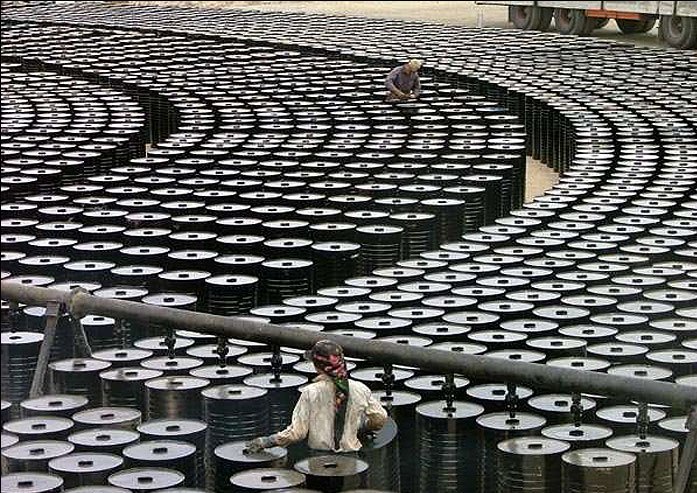 The United States and Saudi Arabia may have conspired to keep crude oil prices down in order for the US to be in charge, according to the former first deputy chairman of the Russian Central Bank.
The United States and Saudi Arabia may have conspired to keep crude oil prices down in order for the US to be in charge, according to the former first deputy chairman of the Russian Central Bank.MOSCOW, November 10 (Sputnik) � The United States has likely conspired with�Saudi Arabia to�keep crude oil prices down, the former first deputy chairman of�the Russian Central Bank told Sputnik.
"[The US] is about�to get the upper hand in�the market, and it warned Saudi Arabia it'd better change its pricing policy if it wanted to�keep its share of�the market. Saudi Arabia took the cue that controlled oil price slashing was the best option," Oleg Vyugin, who now chairs the board of�directors at�Russia's MDM Bank, said.
Vyugin added that if crude prices continued their climb beyond $100 a barrel, US oil production would surge to�more than�10 million barrels a day, topping that of�Saudi Arabia and Russia, while the median price of $70-80 a barrel would lead to�US energy companies putting their oil production projects on�hold.
According to�the economist, the trade-off between�the two key oil producers would allow Saudi Arabia to�dominate the energy market, while the United States would use lower oil prices to�promote its political agenda.
"This policy curbs US oil production and lets Saudi Arabia keep its market," Vyugin opined, adding "as for�Russia, it is a passive player, so what will be with�it, will be."
"[The US] will cap oil production because of�the low prices, while $80 per barrel will allow Saudi Arabia to�stay afloat in�terms of�budget obligations, at�least for�the next couple of�years, because their budget is balanced at�this price and has almost a trillion dollars in�reserve funds," the former Central Bank deputy chairman said.
Vyugin stressed that a deeper slump in�oil prices would, on�the contrary, hurt the United States, Saudi Arabia and the Organization of�Petroleum Exporting Countries (OPEC), meaning the price was likely to�be no less than $70 to $80 a barrel. An adverse scenario, he said, could prompt oil producers to�cut production quotas.
"It will not benefit the OPEC member states, so they will probably cut quotas," Vyugin told Sputnik.
Russian Economic Development Minister Alexei Ulyukayev said earlier he expected global oil prices to�stabilize at $90 per barrel in�the medium-term, although there could be a short-term fall in�prices in�2015.
This comes as�the Russian currency on�Friday set a new record, trading at�48.65 to�the dollar and 60.27 to�the euro. On Monday, the Central Bank predicted zero GDP growth, assuming oil prices would not drop below $90 per barrel.
Russian Central Bank�s Ex-Deputy Head Predicts Ruble's 'Eventual' Recovery
The Russian national currency will eventually exit from�the dive it began back in�June and emerge stronger, the former first deputy chairman of�the Russian central bank told Sputnik.
"Will it hit rock bottom? It will eventually, but�the process will be difficult because the Russian market is organized in�a wrong way, in�which exporters provide foreign currency and investors don't buy Russian assets," said Oleg Vyugin, who now chairs the board of�directors at�MDM Bank, Russia.
The economist did not rule out�the Central Bank intervention to�support ruble and "punish" aggressive dollar buyers if it sees a threat to�the country's financial stability.
"The currency market will then enter a corridor of�volatility and further rates of�ruble growth or depreciation will depend on�oil [prices] and politics. The more predictable these factors are, the less volatile the ruble exchange rate will be," Vyugin told Sputnik.
The pundit said that the current exchange rate of�ruble measured against�foreign currencies would still be enough to�cover Russia's external debt.
"Today's [exchange] rate against�the dollar and euro can support the balance of�payments that ensures debt payments, meaning that imports are likely to�drop so low in�the next few days that the oil price of $82-85 a barrel will provide enough gains to�cover all the debt," he explained.
Vyugin added he believed the ruble could eventually stabilize even without�the Central Bank's involvement as�soon as�purported speculators in�the global Forex market decide to�pull out�of a scheme to�capitalize on�the leaps in�ruble's exchange rate.
"The future scenario, as�I see it, is that the ruble will be weakened until�someone appears in�the market, or maybe a big speculator decides to�reap the profits from�selling huge amounts of�dollars and leaves. At that point the ruble will get stronger again," Vyugin suggested.
The Russian national currency set a new record on�Friday, trading at�48.65 dollars and 60.27 euros. On Monday, the country's Central Bank predicted zero GDP growth, assuming oil prices would not drop below $90 per barrel.
By Sputnik News
The Iran Project is not responsible for the content of quoted articles.










